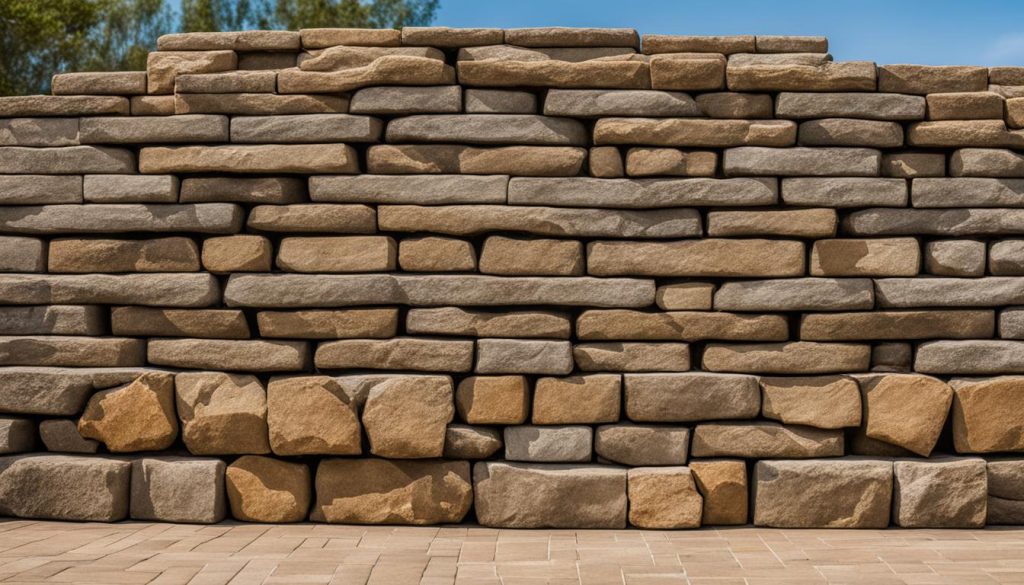Welcome to our article about the various materials used for building retaining walls in Canadian landscapes. As experts in retaining wall repair and construction, we understand the importance of choosing the right material for your project. In this article, we will discuss the advantages and disadvantages of each material to help you make an informed decision for your retaining wall project.
Retaining walls are an essential feature in many residential and commercial properties, providing stability and support to sloping landscapes. The choice of material for a retaining wall depends on several factors, including cost, durability, aesthetic appeal, and the environment in which it will be installed. Each material has its unique characteristics, and it’s essential to weigh the pros and cons to determine the best option for you.
Key Takeaways:
- Choosing the right material for your retaining wall is essential for its long-term durability and stability.
- Each material has its pros and cons, and it’s important to consider your specific needs and the environment in which the retaining wall will be installed.
- Factors to consider when choosing a retaining wall material include cost, durability, aesthetic appeal, and the installation environment.
- The most common retaining wall materials include concrete, wood, stone, brick, gabion, railroad ties, concrete blocks, vinyl sheet piling, and natural stone veneer.
- Our team at Retaining Wall Repair is here to help you choose the right material and provide expert repair and construction services for your retaining wall project.
Concrete Retaining Walls
Concrete is a popular choice for retaining walls in Canada due to its durability and strength. At Retaining Wall Repair, we have extensive experience in designing and installing concrete retaining walls for both residential and commercial properties. Let’s dive into the pros and cons of using concrete as a retaining wall material in the Canadian climate.
Pros
- Concrete walls have a long lifespan, lasting up to 50 years with proper maintenance.
- They are sturdy and can withstand soil erosion and the pressure of heavy loads.
- Concrete walls can be constructed in different shapes and sizes, making them versatile for any landscaping project.
- They require little to no maintenance and are easy to clean.
- Concrete walls can be customized with various textures and finishes to match the aesthetic of your property.
Cons
- Concrete can be expensive compared to other retaining wall materials.
- Installation of concrete walls requires specialized equipment and professionals, which can add to the overall cost.
- Concrete walls are not environmentally friendly, as the manufacturing process produces a significant amount of greenhouse gas emissions.
- They can crack or chip over time, which can affect their appearance and overall structural integrity.
Overall, concrete retaining walls are a durable and reliable option for your landscaping needs. Our team at Retaining Wall Repair has the expertise to design and install concrete walls that meet your specific needs and budget.
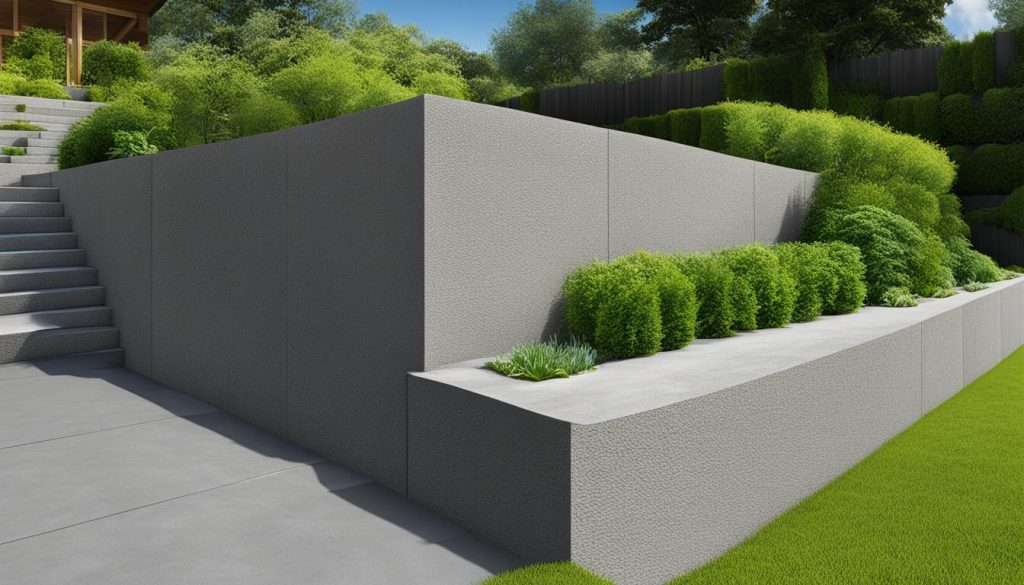
Wood Retaining Walls: Exploring the Pros and Cons
Wood retaining walls offer a natural and rustic charm that can enhance the beauty of any Canadian landscape. However, as with any other retaining wall material, wood also has its advantages and disadvantages. At Retaining Wall Repair, we’re here to help you make an informed decision about whether wood is the right material for your retaining wall project.
Pros of Wood Retaining Walls
- Aesthetics: Wood retaining walls can add a warm and natural feel to your landscape, blending in with the surroundings and enhancing the overall curb appeal of your property.
- Easy to work with: Compared to other materials, wood is relatively easy to work with, making it an ideal choice for DIY projects or smaller retaining walls.
- Cost-effective: Wood is generally less expensive than other materials, making it a popular choice for those on a tight budget.
Cons of Wood Retaining Walls
- Durability: Wood is vulnerable to rot and decay, and may not withstand harsh Canadian weather conditions, especially if not properly treated.
- Maintenance: Wood retaining walls require regular maintenance, such as staining and sealing, to prevent decay and extend their lifespan.
- Limited lifespan: While treated wood can last up to 20 years, its lifespan is relatively shorter compared to other materials like concrete, stone, and brick.
At Retaining Wall Repair, we recommend considering the environmental conditions, the desired lifespan, the installation process, and the overall cost when choosing wood as a retaining wall material. If you opt for wood, we suggest using pressure-treated lumber, which is more resistant to decay and insect damage, and ensuring adequate drainage to prevent water buildup.
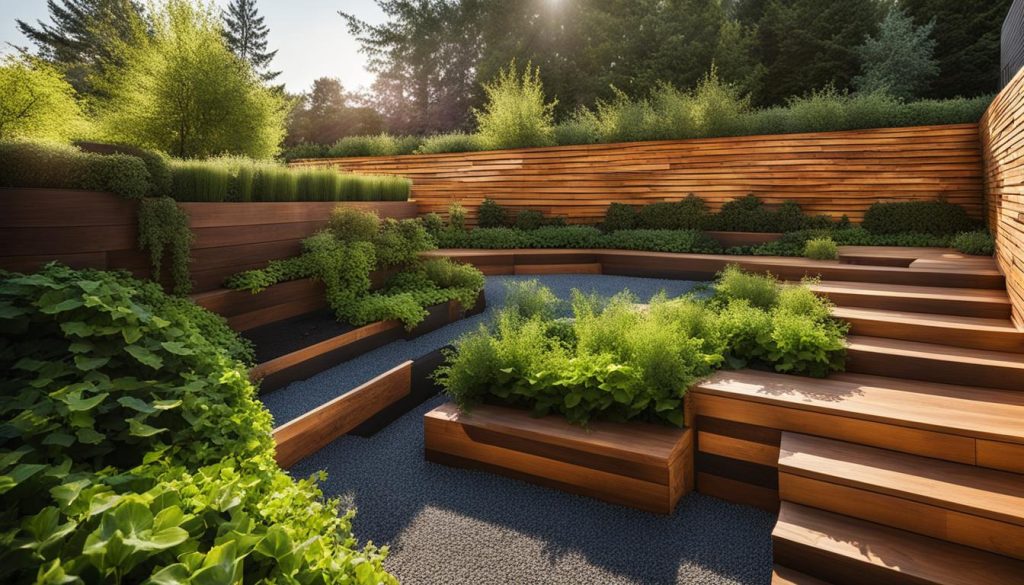
Our team of experts is always ready to offer guidance and support for your retaining wall project. Contact us today to book a consultation or visit our website for more information on our services.
Stone Retaining Walls: Pros and Cons
Stone retaining walls are a popular choice for landscaping projects due to their timeless look and durability. However, before committing to this material, it’s important to understand the pros and cons.
Pros of Stone Retaining Walls
- Durability: Stone walls are known for their strength and longevity, making them an excellent investment for your property. They can withstand harsh weather conditions and are resistant to erosion.
- Aesthetics: Nothing compares to the natural beauty of stone. It blends seamlessly with the environment and creates a classic look that never goes out of style.
- Low Maintenance: Once installed, stone retaining walls require little maintenance. They don’t require painting or staining and won’t rot or warp like some other materials.
- Environmentally Friendly: Using natural stone is an eco-friendly option since it doesn’t release harmful chemicals into the environment. It is also a sustainable material that can be recycled or reused.
Cons of Stone Retaining Walls
- Cost: Stone is one of the most expensive options for building retaining walls. The cost can vary depending on the type of stone you choose, but it can be significantly higher than other materials.
- Installation Time: Stone walls require skilled labor and expertise to install, making the installation process longer than other wall materials.
- Weight: Stone walls are heavy, which can make them difficult to install. Proper drainage and reinforcement may also be needed to support the weight of the wall.
Overall, stone retaining walls are a great option for homeowners looking for a durable and aesthetically pleasing addition to their landscaping. However, the cost and installation time can be limiting factors for some. If you’re interested in a stone retaining wall, be sure to work with a reputable contractor who can guide you through the process and ensure a successful installation.
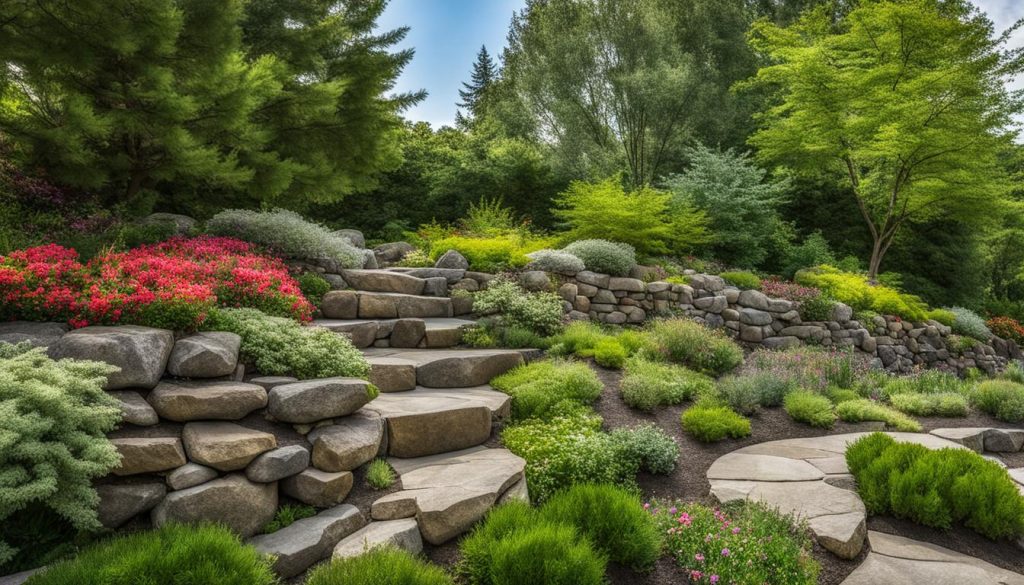
Brick Retaining Walls: The Pros and Cons
Brick retaining walls are a popular choice for those seeking an elegant and timeless look for their landscape. In this section, we will explore the advantages and disadvantages of using brick as a retaining wall material in the Canadian climate.
Pros of Brick Retaining Walls
- Wide range of design options to choose from
- Long-lasting and durable
- Low maintenance required
- Resistant to rot, termites, and fire
- Can retain soil up to 3 feet high
Brick retaining walls provide a classic look that can add value and appeal to your property. With a range of design options available, including different colors, patterns, and shapes, it’s easy to find a style that suits your personal taste and complements the aesthetic of your landscape.
Another advantage of brick retaining walls is their durability. Bricks are resistant to rot, termites, and fire, making them a reliable option for long-term use. With proper installation and maintenance, brick retaining walls can last for decades without needing significant repairs or replacements.
Brick retaining walls are also low maintenance. Unlike other materials that may require regular upkeep, such as staining or sealing, brick retaining walls only need occasional cleaning to maintain their appearance.
Cons of Brick Retaining Walls
- Higher cost compared to other materials
- May require professional installation
- Not suitable for retaining soil over 3 feet high
- May crack or become unstable over time due to weather conditions or improper installation
One of the main disadvantages of brick retaining walls is their cost. Brick is generally more expensive than other materials such as concrete or wood, which can make it a less affordable option for those on a budget.
Additionally, since brick retaining walls require specialized installation techniques, it may be necessary to hire a professional to ensure the wall is built safely and securely. This can add to the overall cost of the project.
Finally, brick retaining walls are not suitable for retaining soil over 3 feet high. If you require a wall that will retain soil at a higher level, you may need to consider other materials that are better suited for the job.
Like all retaining walls, brick walls can become unstable or crack over time due to weather conditions or improper installation. To ensure your brick retaining wall lasts as long as possible, it’s important to have it installed by a qualified professional and to perform regular maintenance.
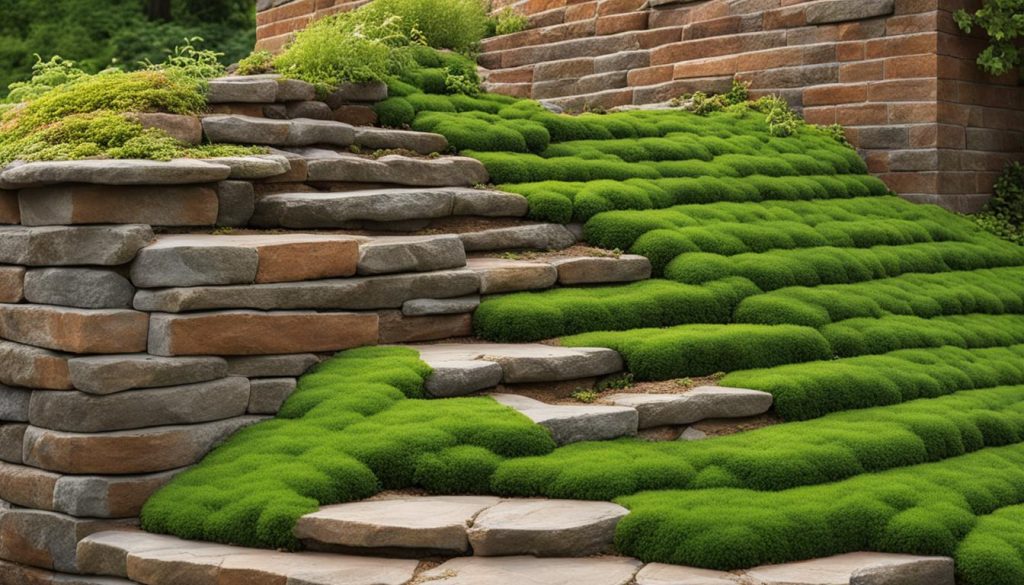
Overall, brick retaining walls are an excellent choice for those seeking a durable, low-maintenance, and aesthetically-pleasing option for their landscape. While they may be a higher-cost option, their classic look and longevity make them a worthwhile investment.
Gabion Retaining Walls: Exploring the Pros and Cons
At Retaining Wall Repair, we believe that gabion retaining walls are a great option for those seeking a sustainable and unique design. Gabion walls are made from wire baskets filled with stones, creating a rustic and visually appealing look suitable for a variety of environments. However, as with any retaining wall material, gabion walls have both advantages and disadvantages that should be considered.
Pros of Gabion Retaining Walls
- Eco-friendly: Gabion walls are environmentally friendly, as they use natural materials that do not harm the surrounding ecosystem.
- Flexible: Gabion walls offer flexibility in design, shape, and size, making them suitable for a variety of landscapes.
- Durable: The wire baskets used for gabion walls are sturdy and can withstand extreme weather conditions.
- Cost-effective: Gabion walls can be more affordable than other retaining wall materials, as the baskets can be filled with stones found on-site, reducing transportation costs.
Cons of Gabion Retaining Walls
- Maintenance: Gabion walls require regular maintenance, as the stones can shift or the baskets can become damaged over time.
- Permeability: Gabion walls are not completely impermeable, which can result in water seeping through the wall and causing erosion or other damage.
- Installation: Gabion walls require skilled installation to ensure that the baskets are aligned correctly and securely fastened together.
- Appearance: While many people appreciate the natural, rustic look of gabion walls, they may not be suitable for all landscapes or design preferences.
Overall, gabion retaining walls offer a unique and sustainable option for retaining wall projects. Before deciding on a gabion wall, it’s important to weigh the pros and cons and consider the specific needs of your landscape. At Retaining Wall Repair, we can help you make an informed decision and provide expert installation and maintenance services for all types of retaining walls.
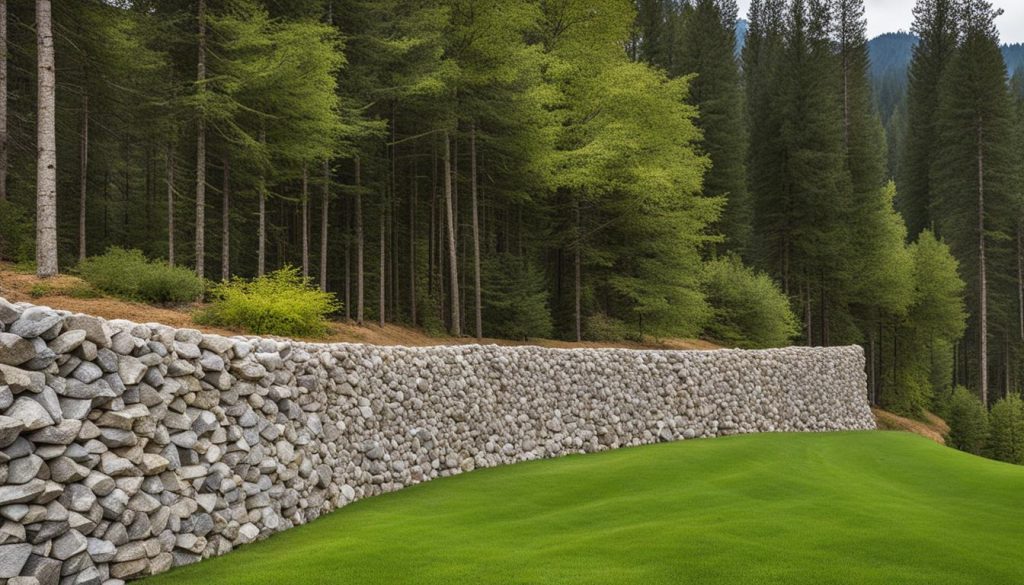
Railroad Tie Retaining Walls: Pros and Cons
When it comes to choosing a material for your retaining wall, railroad ties are a popular and cost-effective option. In this section, we will discuss the pros and cons of using railroad ties as a retaining wall material in the Canadian climate.
Pros
- Affordability: Railroad ties are a cost-effective option, making them an attractive choice for those on a tight budget.
- Durability: Railroad ties are made from hardwood, which can withstand harsh weather conditions and heavy loads.
- Versatility: Railroad ties can be used for both straight and curved retaining walls, allowing for flexibility in design.
- Availability: Railroad ties are widely available at many home improvement and landscaping stores.
Cons
- Environmental Concerns: Railroad ties are treated with chemicals to preserve the wood, which may be harmful to the environment and can leach into the surrounding soil.
- Maintenance: Over time, railroad ties can decay and require replacement or repair.
- Installation: Railroad ties can be heavy and difficult to move, making installation a challenging process.
- Appearance: Railroad ties may not be as visually appealing as other materials, and their rustic appearance may not fit with all landscapes.
Overall, railroad ties are a reliable and cost-effective option for retaining walls in Canada. However, it’s important to consider the potential environmental hazards and maintenance requirements. At Retaining Wall Repair, we offer repair and replacement services for all types of retaining walls, including those made from railroad ties. Contact us today to learn more.
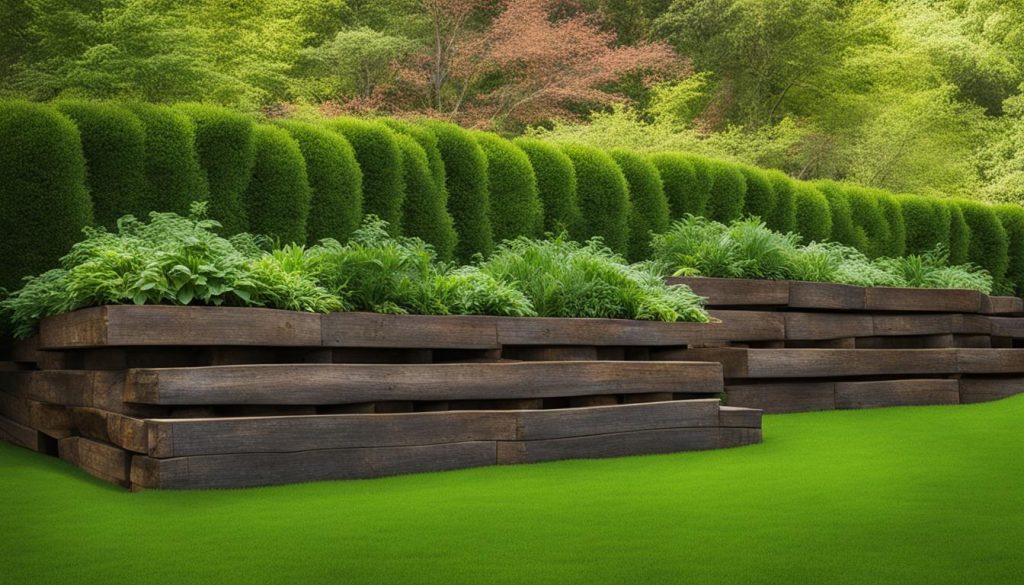
Concrete Block Retaining Walls: Pros and Cons
Concrete blocks are a popular choice for retaining walls due to their versatility and strength. In this section, we will explore the advantages and disadvantages of using concrete blocks as a retaining wall material in the Canadian context.
Pros of Concrete Block Retaining Walls
One of the main advantages of concrete block retaining walls is their durability. They are known for withstanding harsh weather conditions and for being resistant to pests and decay. Additionally, concrete blocks are relatively easy to install, making them a popular choice for DIY enthusiasts.
Another benefit of concrete block retaining walls is their versatility. They are available in various sizes, shapes, and colors, allowing homeowners to customize their retaining walls to match their landscape design. Concrete blocks can also be used to create curved retaining walls, providing a unique aesthetic appeal.
Concrete blocks are also a cost-effective option for retaining walls. They are typically less expensive than natural stone or brick, making them an attractive choice for budget-conscious homeowners.
Cons of Concrete Block Retaining Walls
One of the main disadvantages of concrete block retaining walls is their appearance. While they are available in different colors and textures, some homeowners may find that they lack the natural beauty of materials such as stone or wood.
Concrete block retaining walls also require regular maintenance to prevent cracking, chipping, or crumbling. Additionally, they may not be suitable for areas with high levels of groundwater, as water can seep through the blocks and cause damage over time.
Finally, while concrete blocks are relatively easy to install, they do require proper engineering and construction to ensure their stability and longevity. This may require the assistance of a professional contractor, adding to the overall cost of the project.
| Pros | Cons |
|---|---|
| Durable | Require regular maintenance |
| Versatile | May not be suitable for areas with high groundwater |
| Cost-effective | Appearance may not match natural materials |
| Easy to install | Requires proper engineering and construction |
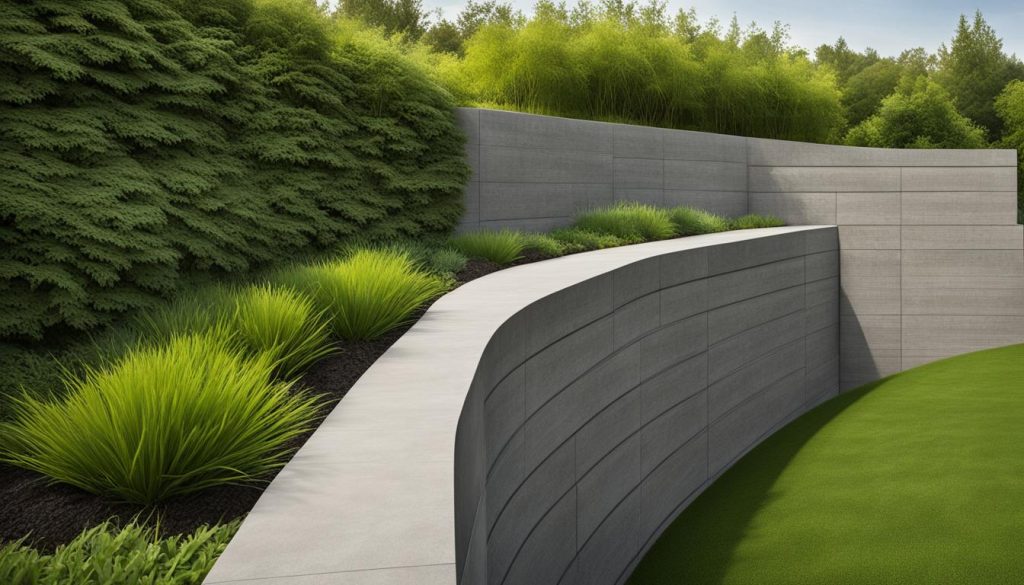
Overall, concrete block retaining walls offer a durable, versatile, and cost-effective option for Canadian homeowners. However, they do require regular maintenance and proper construction to ensure their longevity and stability. Consider your specific needs and the environment in which the retaining wall will be installed to determine if concrete blocks are the right material for your project.
Vinyl Sheet Piling Retaining Walls: Pros and Cons
When it comes to retaining walls, vinyl sheet piling is a modern and innovative material that offers a range of benefits. However, like any other material, there are also some drawbacks to consider. In this section, we will discuss the pros and cons of using vinyl sheet piling as a retaining wall material, so you can decide if it’s the right choice for your project.
Pros
- Durability: Vinyl sheet piling is highly resistant to corrosion, rot, and pests, making it a long-lasting solution for retaining walls.
- Easy Installation: Vinyl sheet piling is lightweight and easy to install, reducing labor costs and time spent on the project.
- Cost-Effective: Compared to other materials, vinyl sheet piling offers a cost-effective solution for retaining walls, especially for larger projects.
- Low Maintenance: Vinyl sheet piling requires minimal maintenance, with no need for painting, staining, or other treatments.
- Sustainability: Vinyl sheet piling is made from recycled materials and is recyclable at the end of its lifecycle, making it an environmentally friendly option.
Cons
- Appearance: While newer designs offer a range of colors and patterns, vinyl sheet piling may not have the same aesthetic appeal as natural materials like wood or stone.
- Temperature Sensitivity: Vinyl sheet piling can become brittle in extreme cold or hot temperatures, which could lead to cracking or other damage.
- Impact Resistance: Vinyl sheet piling may not be able to withstand heavy impact or pressure as well as other materials like concrete or steel.
- Construction Limitations: Due to the lightweight nature of vinyl sheet piling, it may not be suitable for certain soil types or high load-bearing applications.
Overall, vinyl sheet piling is a durable, cost-effective, and low maintenance option for retaining walls. However, it may not be the best choice for every project. If you’re still unsure whether vinyl sheet piling is right for your retaining wall, our team at Retaining Wall Repair can help you make an informed decision. Contact us today for more information on our services and expertise.
Natural Stone Veneer Retaining Walls
Natural stone veneer is becoming a popular choice for retaining walls due to its cost-effective price and aesthetically pleasing appearance. It provides the same timeless beauty of solid stone, but at a lower cost.
The natural stone veneer is typically made by cutting a thin layer of natural stone from a larger piece, which is then adhered to a backing material, making it easier to handle and transport.
One advantage of using natural stone veneer is its versatility. It can be used in a variety of retaining wall designs, from traditional to modern, and it comes in a wide range of colors, textures, and shapes. It can also be customized to fit any size or shape needed.
However, there are some disadvantages to consider before choosing natural stone veneer for your retaining wall project. One issue is its durability compared to solid stone. While it may be more cost-effective, it is also more susceptible to chipping or cracking over time, especially in areas with harsh weather conditions.
Another factor to consider is the installation process. Natural stone veneer requires a skilled installer to ensure it is properly adhered to the backing material and the wall surface. Improper installation can lead to issues such as flaking and peeling.
Here is a comparative table of the pros and cons of natural stone veneer retaining walls:
| Pros | Cons |
|---|---|
| More cost-effective than solid stone | Less durable than solid stone, prone to chipping and cracking |
| Customizable to fit any size or shape needed | Requires a skilled installer for proper installation |
| Wide range of colors, textures, and shapes to choose from | May require more maintenance than other retaining wall materials |
At Retaining Wall Repair, we offer a variety of services for retaining walls, including installation, repair, and maintenance. Contact us at (647) 812-9837 if you have any questions or need assistance with your retaining wall project. Visit our website for more information: https://www.retainingwallrepair.ca/
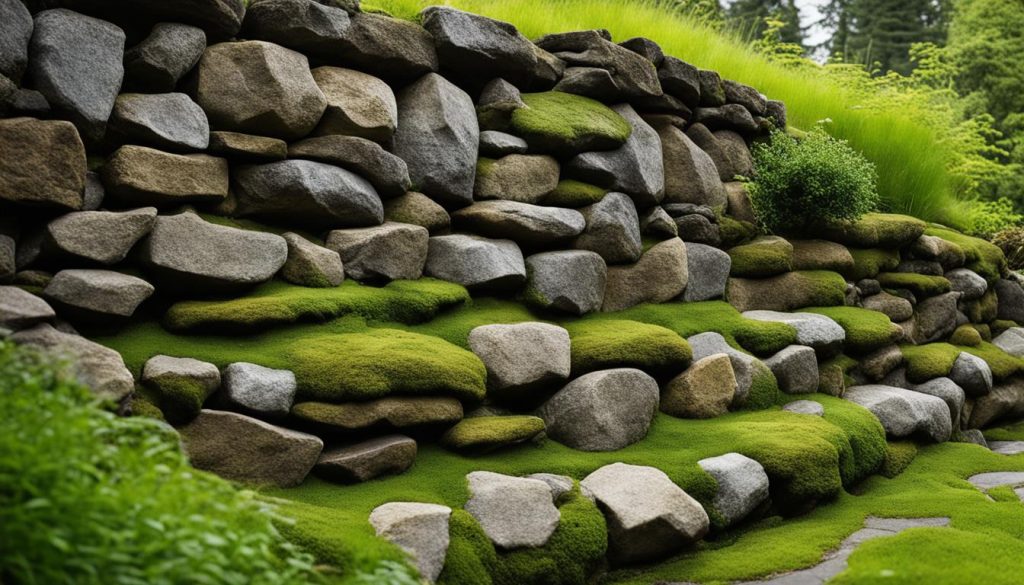
Choosing the Right Material for Your Retaining Wall
After evaluating the pros and cons of different retaining wall materials, you may be wondering which one is the most suitable for your project. The answer depends on various factors, including your budget, the environment in which the retaining wall will be built, and your preference for aesthetic appeal.
If you’re on a tight budget, railroad ties or concrete blocks can provide a cost-effective option for your retaining wall. However, keep in mind that railroad ties may not be as durable as other materials, and concrete blocks may not be as visually appealing as natural stone or brick.
On the other hand, if you’re looking for a more natural and aesthetically pleasing option, wood or natural stone veneer may be suitable for your project. Both materials offer a timeless and elegant look, but they may require more maintenance and upkeep than other materials.
For those who prioritize durability and strength, concrete or stone are popular choices for retaining walls. Concrete is known for its durability and strength, while stone provides a natural and long-lasting option for your landscape.
If you’re looking for a unique and sustainable option, gabion baskets filled with stones may be the perfect fit for your retaining wall. And for those who prioritize ease of installation, vinyl sheet piling is a modern solution that is gaining popularity in Canada.
Ultimately, the right material for your retaining wall will depend on your specific needs and preferences. We recommend consulting with a professional retaining wall contractor to help you make an informed decision for your project.
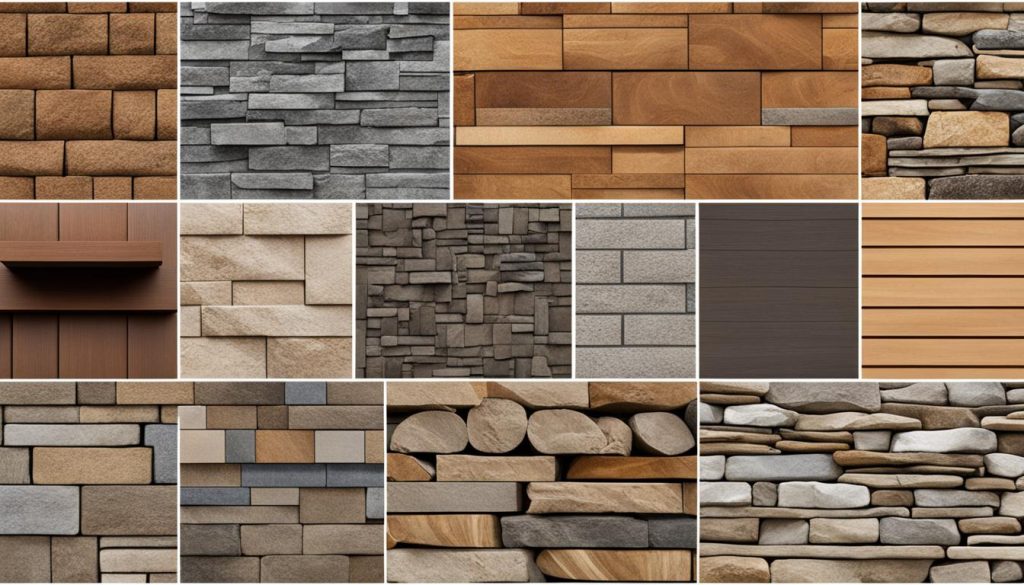
At Retaining Wall Repair, we have years of experience in building, repairing, and maintaining retaining walls in the Canadian climate. We can provide expert guidance and assistance in choosing the right material for your retaining wall project.
Contact Us for Retaining Wall Repair
If you’re in need of retaining wall repair or have any questions about your retaining wall project, our team at Retaining Wall Repair is here to help. We understand the importance of a sturdy and functional retaining wall, and we are committed to providing you with the best possible service.
Our experienced professionals have the knowledge and tools necessary to repair any type of retaining wall, whether it’s made of concrete, wood, stone, or any other material. We can also assist you in choosing the right material for your new retaining wall project.
When you contact us, we will schedule a consultation to assess your retaining wall and provide you with a free estimate. We will work with you to create a customized plan that fits your needs and budget.
Don’t let a damaged retaining wall cause further problems for your landscape. Contact us for retaining wall repair today at (647) 812-9837 or visit our website for more information: https://www.retainingwallrepair.ca/
FAQ
What are the pros and cons of concrete retaining walls?
Concrete retaining walls are known for their durability and strength, making them a popular choice. However, they can be more expensive to install and may require regular maintenance to prevent cracking or deterioration.
What are the advantages and disadvantages of wood retaining walls?
Wood retaining walls offer a natural and aesthetically pleasing option. They are generally more affordable than other materials but may be prone to rotting or insect damage over time.
What are the pros and cons of stone retaining walls?
Stone retaining walls are highly durable and have a timeless beauty. However, they can be more expensive to install and may require professional expertise. Additionally, they may not be suitable for areas with frequent freeze-thaw cycles.
What are the advantages and disadvantages of brick retaining walls?
Brick retaining walls add an elegant touch to any landscape. They are versatile and long-lasting. However, they can be more expensive than other options and may require periodic maintenance to prevent shifting or crumbling.
What are the pros and cons of gabion retaining walls?
Gabion retaining walls offer a unique design and are environmentally friendly. They are relatively easy to install and can withstand harsh weather conditions. However, they may be more costly than other materials and require regular maintenance to prevent erosion.
What are the advantages and disadvantages of railroad tie retaining walls?
Railroad tie retaining walls are a cost-effective option. They are durable and can be easily installed. However, they may not be as aesthetically pleasing as other materials, and there are potential concerns regarding the chemicals used to treat the ties.
What are the pros and cons of concrete block retaining walls?
Concrete block retaining walls offer versatility and strength. They are relatively easy to install and can be customized to fit different designs. However, they may require additional reinforcement in certain situations, and the cost can vary depending on the specific blocks used.
What are the advantages and disadvantages of vinyl sheet piling retaining walls?
Vinyl sheet piling is a modern solution that provides durability and easy installation. It is resistant to corrosion and can withstand harsh conditions. However, it may be more expensive than other materials and may not be suitable for all soil types.
What are the pros and cons of natural stone veneer retaining walls?
Natural stone veneer offers a cost-effective alternative to solid stone walls. It provides a similar aesthetic appeal and is generally more lightweight. However, it may require additional maintenance to prevent cracking or shifting, and the installation process can be more complex.
How do I choose the right material for my retaining wall?
When choosing a material for your retaining wall, consider factors such as durability, cost, aesthetics, and the specific environment where the wall will be installed. It’s important to evaluate the pros and cons of each material and consult with professionals if needed.
How can I contact Retaining Wall Repair for assistance?
If you have any questions or need assistance with your retaining wall project, please don’t hesitate to contact us at (647) 812-9837. Our team at Retaining Wall Repair is here to help. Visit our website for more information on our services: https://www.retainingwallrepair.ca/.

